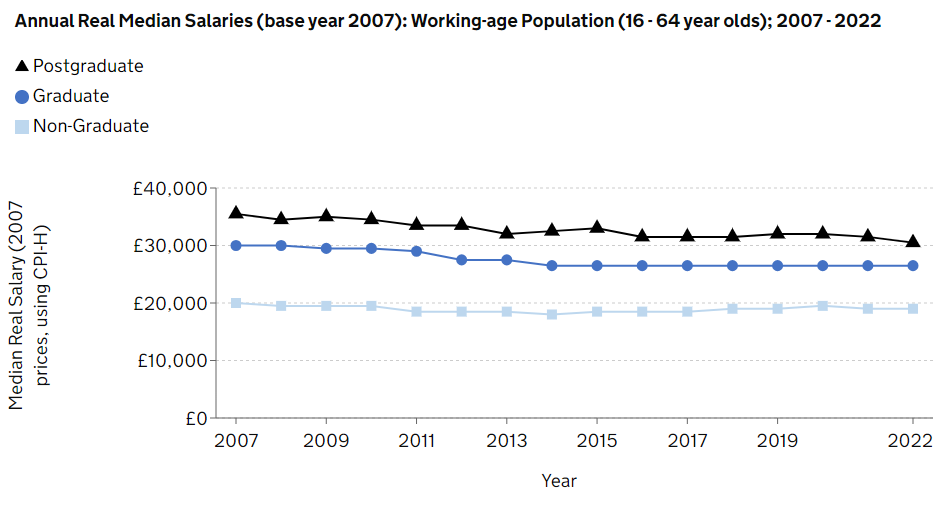What is the average graduate salary?
The average graduate salary will depend on several factors such as career type, industry and location. You may arrive at your graduate salary in different ways if you have a salary bands in place for instance. Luckily, there is information out there that takes these factors into consideration and produces an average graduate salary report. In addition to GRB data on average graduate salaries there are three other reports that many graduate recruiters use to benchmark their salaries are produced by High Fliers Research, the Institute of Student Employers (ISE) and GOV.UK as detailed below.
GRB Graduate Average Salary Index
Based on a broad range of clients across a variety of sectors, regions and vacancy types, our index gives you an accurate view on the latest data collected by quarter.
Q3 2023 £28,739
Q2 2023 £28,016
Q1 2023 £27,616
Q4 2022 £28,624
Q3 2022 £27,483
Q2 2022 £27,972
Q1 2022 £28,501
The ISE Survey
Graduates starting with 169 ISE members representing 42,846 hires, had a median starting salary of £32,000 in 2023 (£30,921 in 2022).
Here's the breakdown by sector for median graduate salaries (2022 in brackets):
- Charity & Public sector £28,000 (£27,299)
- Built environment £29,500 (£25,500)
- Energy, Engineering & Industry £31,000 (£25,500)
- Retail & FMCG company £32,000 (£26,000)
- Health & Pharmaceuticals £31,250 (£28,500)
- Finance & Professional Services £33,500 (£27,687)
- Digital & IT £33,000 (£26,000)
- Legal £47,000 (£40,750)
GOV.UK
The Graduate Labour Market Statistics (GLMS) covers labour market conditions for English domiciled graduates and postgraduates and compare these to English domiciled non-graduates. This edition of the GLMS summarises the annual employment and earning outcomes data for graduates, postgraduates and non-graduates in 2022. All earnings data in this publication are calculated for full-time workers only.
In 2022, the median nominal salary for working-age graduates was £38,500. This was £11,500 more than working-age non-graduates (£27,000), but £6,500 less than working-age postgraduates (£45,000). In nominal terms, salaries increased for all groups. However, in real terms (2007 prices, using CPI-H), salaries for graduates and non-graduates remained the same from 2021 to 2022, whilst postgraduates saw a decrease of £1,000. The gap between the median salaries of graduates and non-graduates has increased by £1,000 since 2021 in nominal terms and by £500 in real terms. Please note, salaries are calculated using earnings from individuals’ .

The High Fliers Survey
The average graduate salary in 2022 is £32,000 (£30,000 in 2021).The figures do not include additional benefits such as relocation allowances, regional weighting, subsidised company facilities or bonus schemes. This survey asks companies in the Times Top 100 Graduate Employers.
Here's the breakdown by sector:
- Investment banking £50,000 (£50,000 in 2021)
- Law £50,000 (£46,000 in 2021)
- Consulting £47,500 (£45,000 in 2021)
- Oil & energy £40,000 (£40,000 in 2021)
- Banking & Finance £38,000 (£32,500 in 2021)
- Retailing £36,800 (£36,800 in 2021)
- Armed Forces £33,000 (£27,800 in 2021)
- Consumer goods £32,000 (£32,000 in 2021)
- Technology £32,000 (£32,000 in 2021)
- Accounting & professional services £32,000 (£30,600 in 2021)
- Media £31,500 (£32,500 in 2021)
- Engineering & industrial £28,500 (£28,000 in 2021)
- Public sector £23,100 (£24,200 in 2021)
“The key for us, number one, has always been hiring very smart people.”
- Bill Gates, Microsoft
-
Employer Services
- Recruitment Consultancy
- Graduate Recruitment Outsourcing
- Recruitment Advertising
- Webinars & Virtual Workshops
- Postgraduate Course Advertising
- Diversity and Inclusion
- Graduate Recruiter FAQ
- Why Use GRB?
- Student and Graduate Marketing
- GRB Talent Pool Data
- Graduate Placement Map
- Recruiter Blog
- Recruiter Live Chat
- Client Testimonials
-
Research for Recruiters
- Attending Careers Fairs
- Effective Graduate Onboarding
- Diversity in the Workplace
- Effective Interviewing
- Employer Branding
- Institute of Student Employers (ISE)
- Running an Internship
- Gaining Value from Placements
- Generation Y and Z
- The Essential Graduate Recruiters Checklist
- The Recruitment Process
- The Recruitment Framework
- Promoting Diversity and Avoiding Discrimination
- Selection Methods
- Competency-Based Recruitment
- Employment Checks
- Marketing to Students
- Employment Law
- Running a Graduate Recruitment Campaign
- SMEs and Graduates
- The UCAS Tariff
- Candidate Psychometric Testing
- International Degree Equivalents
- The 7 Benefits of Hiring Graduates
- A Level Equivalents Guide
- University League Table
- Graduate Recruiters Network
- Rising Stars
- Student Diaries
- Study in Australia or New Zealand
- Recruiter Blog
-
Client Case Studies
- Virtual Assessment Centres for French Multinational
- Fast Growing US Tech Firm Needed STEM Graduates
- Meeting Diversity Targets for Graduate Scheme Case Study
- Pipeline for Leadership Team
- Graduate Rotational Management Scheme Case Study
- Graduate Leadership Programme Case Study
- Work Ready Graduates Needed
- RPO Solution
- FTSE250 Recruiter Project
- Technology Graduate Scheme
- SME Recruitment
- Boost Candidate Response
- International Graduate Recruitment Campaign
- Last Minute Recruitment
- GRB Rising Star Recruited
- Graduate Delivered Within 24 Hours
